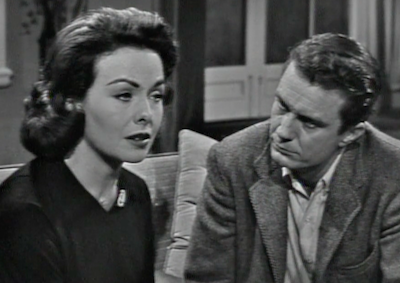Made possible by the John H. Mitchell Television Programming Endowment
The United States Steel Hour: “The Man Who Knew Tomorrow” (CBS, 9/21/1960)
Stars Cliff Robertson (PT 109) and Jeanne Crain (A Letter to Three Wives) shine in this live television drama from New York that embodies the pervasive Cold War paranoia of the 1960s while leaning heavily into the indelible “middle ground between light and shadow” mise-en-scène of the original Twilight Zone series. The spy thriller concerns a mystery writer (Robertson) who is thrust into a dangerous and unpredictable world of intrigue when a mysterious woman (Crain) suddenly appears at his window during a storm—just as he describes such a scenario at his typewriter. When the woman’s husband and physician subsequently arrive searching for her under suspicious pretenses, the writer’s own sanity soon begins to blur fever dream and deadly reality. The tense teleplay was adapted by Harold Gast (writer of the teleplay for the Emmy-winning miniseries A Woman Called Golda) from a television play by Paul Lee originally presented in England.
Premiering on ABC-TV in 1953 amid a crowded broadcast landscape of similar dramatic programs, U.S. Steel Hour (single-sponsored by United States Steel Corporation) distinguished itself as one of the most prestigious and longest-running anthology series of the “golden age of television.” Actor Cliff Robertson starred in numerous installments of the series, including “The Two Worlds of Charlie Gordon” (1961), where he originated the title role for which he would later win a Best Actor Academy Award in the film Charly (1968).
B&w, 60 min. Produced by the Theatre Guild. Executive producer: George Kondolf. Director: Tom Donovan. Writer: Harold Gast. From a television play by Paul Lee. Cast: Jeanne Crain, Cliff Robertson, Paul McGrath, Tim O'Connor.
Preserved from a 2” videoreel by the UCLA Film & Television Archive.
The screening will be introduced by Mark Quigley, John H. Mitchell Television Archivist. Program curated and notes written by Mark Quigley.






 Mobile Navigation
Mobile Navigation

